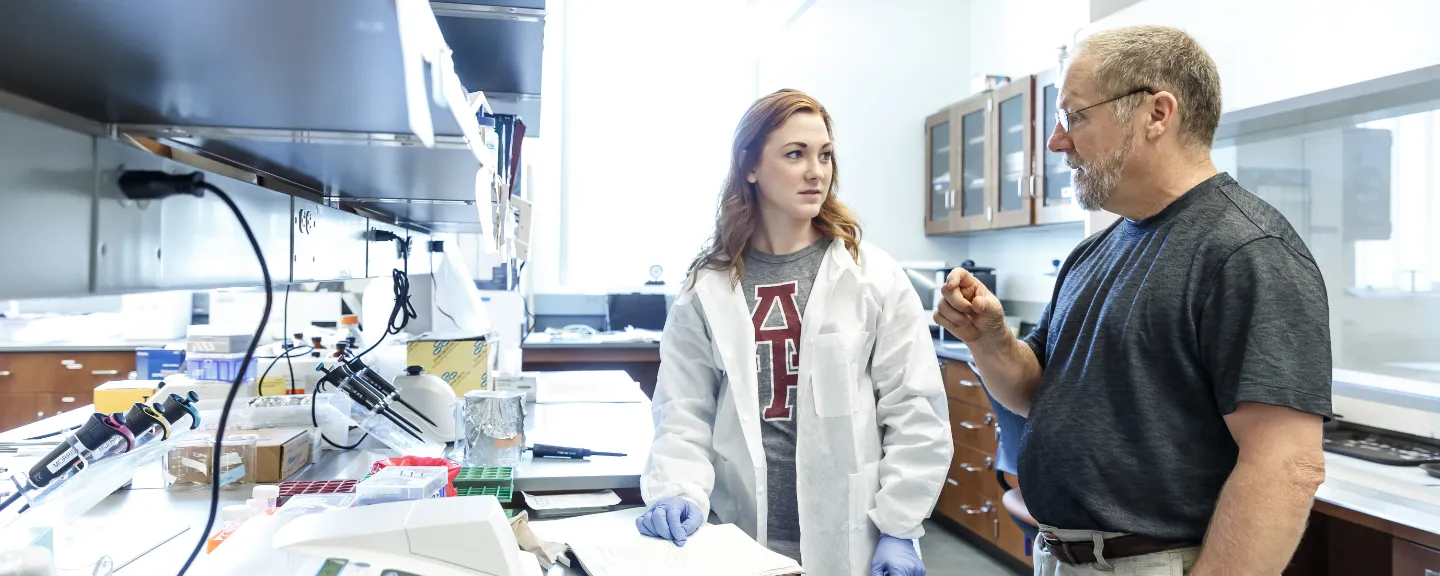- Home
- >
- APU Articles
- >
- News Article
Cultivating STEM Leaders through Research as an R2 Institution
July 12, 2023 | Written By Nathan Foster

Funding from this investment enables schools across APU to purchase replacements for aging materials and new state-of-the-art equipment. “This allows us to enhance our research and innovation in the College of Liberal Arts and Sciences (CLAS), the School of Behavioral and Applied Sciences, and the School of Nursing, further positioning APU as a leader in academic research,” said Louise Ko Huang, PhD, acting dean of CLAS. “With the integration of Christian faith and ethics in these endeavors, APU is poised to raise skilled leaders who can impact society for God’s kingdom.”
STEM Research Highlights
A major portion of the research funding is dedicated to strengthening APU’s science, technology, engineering, and math (STEM) programs. As fast growing fields with high earning job opportunities after graduation, APU has seen an increase in STEM enrollment. The university gives students rare opportunities to conduct research with faculty mentors while in undergraduate studies. Recent faculty STEM research projects include:
- Computer simulation to understand biomolecular motor chemo-mechanics for pharmaceutical usages (Sándor Volkán-Kacsó, PhD, physics)
- Designing better data visualizations to help educators make data-informed decisions (Kaitlyn Fitzgerald, PhD, statistics)
- Exploring the interaction of music and movement in the brain (Aisha Chen, PhD, engineering)
- Developing cybersecurity and satellite communications capabilities for undergraduate research (James H. Yeh, PhD, computer science)
- Exploring the molecular intricacies of human drug-metabolizing enzymes and their substrates (Phil Cox, PhD, chemistry)
- Using an automated high-throughput tracking system in cockroaches to understand brain injury trauma effects on learning and memory (Kenneth Sossa, PhD, biology)
- Enhanced teaching and learning anatomy by using the 3D touch screen technology Anatomage Table (Sossa and Ryan Somers, PT, DPT, biology)
- Exploring novel therapeutics development and biopharmaceutics that minimize the extensive use of animal testing (David Dyer, PhD, MS, biotechnology)
New Bioengineering Facility
In September, APU will introduce a bioengineering facility, the only of its kind among CCCU schools. A new live-cell imaging system and Franz-diffusion chamber system will enable researchers to conduct structure/function analyses. The new equipment also includes a Cell-Ink BIO-X 3-D tissue printer, which can construct three-dimensional tissue models of major organs including skin, liver, intestine, heart, pancreas, and brain. “Using organ-specific models allows us to generate data about the usefulness of such models as an alternative to animal testing,” Dyer said. “This results in two benefits: allowing us to speed up the process of candidate drugs screening at a lower cost and using human-derived cells and tissues, instead of non-human derived cells and tissues, which will provide more pertinent data on the action of drug candidates in human systems.”
The opening of this bioengineering lab is timely. President Joe Biden recently announced an executive order advancing biotechnology and biomanufacturing innovation. “Our new tissue engineering facility will address core components of the President’s policies by improving efficiencies in high-throughput drug candidate screening systems,” Dyer said. “As a Christian university, APU is uniquely situated to provide ethically-sound solutions in keeping with national policy in the area of therapeutics development.” The 2023 BIO Impact Report indicates that biotechnology and biopharmaceutics lead the economic sector divisions for California, meaning there will be continual and rising need for skilled workers in these areas. “With the newly acquired equipment in the bioengineering facility, our MS in Biotechnology (MSBT) program is set to contribute in significant ways towards these needs,” Huang said.